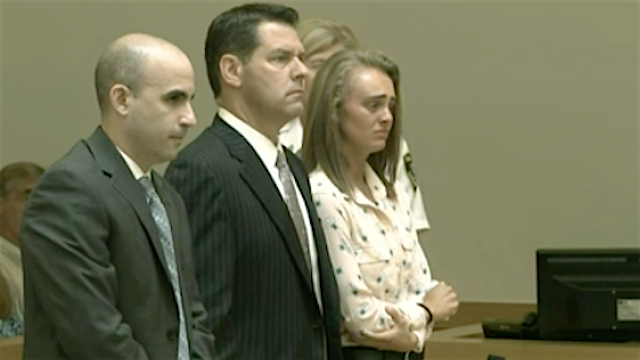
Michelle Carter, the Massachusetts woman convicted today of involuntary manslaughter for telling her boyfriend to continue on with a suicide attempt when they were both teen high school students, will be sentenced August 3rd.
She faces one of several possible paths.
Carter was charged with involuntary manslaughter, a common-law crime, as a youthful offender. Youthful offender status provides judges with three possible sentencing options.
First, it’s possible Carter could be committed to prison for the full possible adult sentence. For involuntary manslaughter, the possible maximum penalty for Carter is no more than twenty years in prison. She could also face a $1,000 fine coupled with a sentence of not more than two and a half years in prison. If Carter is ordered to a prison under this first possible option, she could be ordered to adult confinement. She’s over the 18-year limit under the sentencing statute for imprisonment “in a youthful offender unit separate from the general population of adult prisoners.”
Second, it’s possible Carter could be sentenced to a “combination sentence.” She could be committed to the department of youth services until she’s twenty one years old (Carter is currently twenty). After that, she would receive an adult sentence — in theory. It would be suspended pending a successful probation period.
Third, it’s possible Carter could be committed to the department of youth services until she’s 21.
The options before Juvenile Court Judge Lawrence Moniz, who presided over the trial, are therefore rather broad.
It’s important to note, however, that the overarching principle of youthful offender law is that parties brought before the court “shall be treated, not as criminals, but as children in need of aid, encouragement and guidance.”
That guidance is something the judge will have to take into account.
The judge will also have to consider sentencing recommendations. The recommendations must protect both “the present and long-term public safety.” Here are factors the court must consider:
- The nature, circumstances and seriousness of the offense;
- Victim impact statement(s);
- A report by a probation officer concerning the history of the youthful offender;
- The youthful offender’s court and delinquency records;
- The success or lack of success of any past treatment or delinquency dispositions regarding the youthful offender;
- The nature of services available through the juvenile justice system;
- The youthful offender’s age and maturity;
- The likelihood of avoiding future criminal conduct; and
- Any other factors it deems relevant to disposition.
Until she’s sentenced, Michelle Carter remains out on bail, but with conditions: (1) she cannot have any contact whatsoever, including through a third party, with the family of Conrad Roy, the young man who committed suicide; (2) she cannot apply for a passport; and (3) she cannot leave the Commonwealth of Massachusetts without first obtaining an order from a juvenile court judge in Massachusetts.